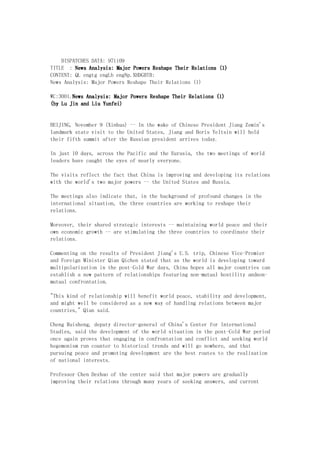
Major Powers_en
- 1. DISPATCHES DATA: 971109 TITLE : News Analysis: Major Powers Reshape Their Relations (1)News Analysis: Major Powers Reshape Their Relations (1)News Analysis: Major Powers Reshape Their Relations (1)News Analysis: Major Powers Reshape Their Relations (1) CONTENT: QL engtg engLb engNp.XHDGBTB: News Analysis: Major Powers Reshape Their Relations (1) WC:3001.News Analysis: Major Powers Reshape Their Relations (News Analysis: Major Powers Reshape Their Relations (News Analysis: Major Powers Reshape Their Relations (News Analysis: Major Powers Reshape Their Relations (1)1)1)1) (by Lu Jin and Liu Yunfei)(by Lu Jin and Liu Yunfei)(by Lu Jin and Liu Yunfei)(by Lu Jin and Liu Yunfei) BEIJING, November 9 (Xinhua) -- In the wake of Chinese President Jiang Zemin's landmark state visit to the United States, Jiang and Boris Yeltsin will hold their fifth summit after the Russian president arrives today. In just 10 days, across the Pacific and the Eurasia, the two meetings of world leaders have caught the eyes of nearly everyone. The visits reflect the fact that China is improving and developing its relations with the world's two major powers -- the United States and Russia. The meetings also indicate that, in the background of profound changes in the international situation, the three countries are working to reshape their relations. Moreover, their shared strategic interests -- maintaining world peace and their own economic growth -- are stimulating the three countries to coordinate their relations. Commenting on the results of President Jiang's U.S. trip, Chinese Vice-Premier and Foreign Minister Qian Qichen stated that as the world is developing toward multipolarization in the post-Cold War days, China hopes all major countries can establish a new pattern of relationships featuring non-mutual hostility andnon- mutual confrontation. "This kind of relationship will benefit world peace, stability and development, and might well be considered as a new way of handling relations between major countries," Qian said. Cheng Ruisheng, deputy director-general of China's Center for International Studies, said the development of the world situation in the post-Cold War period once again proves that engaging in confrontation and conflict and seeking world hegemonism run counter to historical trends and will go nowhere, and that pursuing peace and promoting development are the best routes to the realization of national interests. Professor Chen Dezhao of the center said that major powers are gradually improving their relations through many years of seeking answers, and current
- 2. relations between them are becoming more balanced, moving toward maturity, and are seen as in a relatively stable state. This favorable relationship between major powers reflects the trend of global multipolarization, and will produce a positive impact on world peace and development in the new century, he says. In the post-Cold War period, common interests between China and the United States have intensified rather than weakened. The two have become indispensable trading partners, and the stable political relations will help expand bilateral economic and trade cooperation. During President Jiang's U.S. visit, China and the United States decided to "build toward a constructive strategic partnership." As a result, Sino-U.S. relations have made tangible progress in political, economic and trade issues. (more)nnnn DISPATCHES DATA: 971109 TITLE : News Analysis: Major Powers Reshape Their Relations (2) CONTENT: QL engtg engLb engNp.XHDGBTB: News Analysis: Major Powers Reshape Their Relations (2) WC:2936.News Analysis: Major Powers Reshape Their Relations (2) When Russian President Yeltsin visited China in April of 1996,the two countries signed a joint statement declaring that the two sides would develop a strategic and cooperative partnership of equality and trust oriented toward the 21st century. President Jiang paid a successful visit to Russia in April of1997, during which Jiang and Yeltsin signed a joint statement on the multipolarization of the world and the establishment of a new international order. In Yeltsin's upcoming China visit, the two countries will issue another joint statement and sign several cooperative agreements. In addition to the regular meetings between the two heads of state, a similar mechanism between prime ministers of the two countries was set in motion beginning at the end of last year. Local analysts say that the two partnerships -- China-U.S. and China-Russia -- have prominent characteristics in common: both are established on the basis of mutual understanding and with a view toward the 21st century; both are moving toward stability and forming a mechanism; the countries concerned strive for multi-tiered and multi-dimensional cooperation, particularly in economic, trade,
- 3. scientific and technological areas; and they seek common ground on major issues while reserving differences on minor ones. Both Sino-U.S. and Sino-Russian relations have developed as they have because the three countries approach their relationships with an eye on the new century and by proceeding from the fundamental interests of their own people and the people of theworld as a whole. The current relationships between major powers stress cooperation and consultation, and do not exclude each other. The progress of certain bilateral relations will not harm the interests of any third party. In this way, this pattern of partnerships is totally different from that during the Cold War period. Russian Foreign Minister Yevgeny Primakov, commenting on the China-U.S. summit, said Russia would like to see Sino-U.S. relationships improve, and believed that it is a "factor of stability of the international situation." He said the improvement of Sino-U.S. relations will not affect Russia-China relations, because Russia has very good relationships with both China and the United States. He expressed the hope that Russia's relationships with the two countries will develop further. Professor Xiong Zhiyong and associate professor Yang Chuang from the Foreign Affairs College pointed out that the establishment of stable bilateral relations between China and the U.S., between China and Russia and between Russia and the U.S. will help shape a new international political and economic order. Enditemnnnn